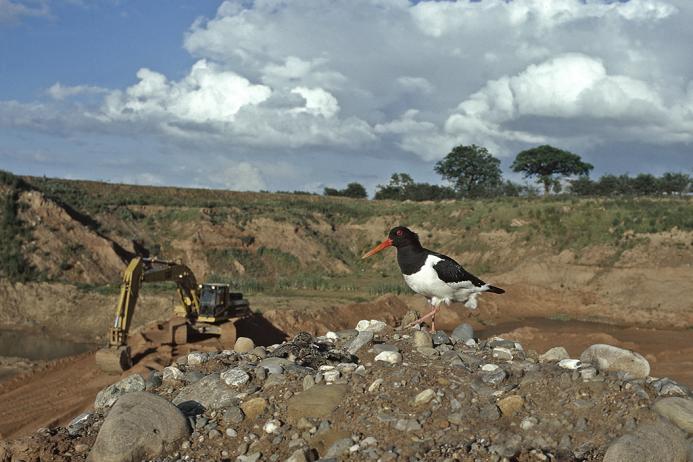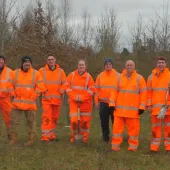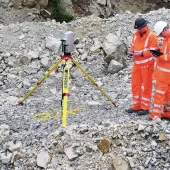MPA welcomes Corry review recommendations
Fresh ideas to improve environmental regulations are good for growth and nature, says MPA
THE recommendations of an independent review into Defra’s regulatory landscape, published today, have been welcomed by the Mineral Products Association (MPA). It says Dan Corry’s report on environmental regulators and regulations is encouraging and – if the recommendations are implemented – could pave the way for Defra to deliver better outcomes for nature and for the economy.
Among the key suggestions in the Corry review are actions to improve co-operation between different regulators on major projects, to reduce duplication and overlap in applying the rules. Also included are proposals to retain staff who have specialist sector expertise and to give trusted organizations greater autonomy to fast-track nature recovery schemes.
The MPA’s recent Quarries & Nature 2025 event, held in London last month, celebrated the close partnership between the mineral products industry and wildlife organizations, such as RSPB and the Wildlife Trusts. Working together, the industry and conservationists are implementing high-quality management programmes and restoration schemes nationwide that significantly enhance biodiversity.
In recent decades, more than 83km2 of UK priority habitat have already been delivered, with a further 110km2 in the pipeline – vast areas equivalent to the size of Nottingham and Liverpool respectively.
Speaking at Quarries & Nature 2025, Beccy Speight, chief executive of the RSPB, highlighted the quarrying industry’s track record as well as future potential to deliver positive outcomes for nature and at the same time supporting economic growth: ‘The minerals industry really is leading the way, showing how biodiversity can be embraced, and that growth for business and nature can be achieved hand in hand,’ she said.
Mark Russell, executive director of the MPA, said: ‘This review contains lots of ideas that are really welcome, and we hope to see them implemented. The mineral products sector is committed to delivering huge benefits for nature while supplying essential materials for the economy, and this review suggests better ways to encourage both of these. The key challenge is delivery, and we will be pushing Defra and the regulators to ensure this review leads to change.
‘The mineral products industry is deeply committed to high environmental standards and nature recovery, as demonstrated at Quarries & Nature 2025, but our members are also often frustrated by how slowly and inefficiently regulation is applied. Regulators that are effective and focused on enabling better outcomes for business and the environment are an important part of the UK’s need to deliver on economic growth and nature recovery.’
Key recommendations from the review that are relevant to the mineral products sector include:
Recommendation 5: Support better co-operation between regulators and appoint a lead regulator for all major projects in which multiple regulators have an interest. MPA members and their customers deal with multiple regulatory and planning bodies which leads to significant inefficiency so streamlining would be welcome.
Recommendation 6: Assess potential for regulators to have targeted pay flexibility so they can employ and retain staff, particularly specialist staff. Minerals is a specialist industry and there is a clear lack of capacity and capability in the regulators, causing delays and poor decisions.
Recommendation 10: Set up a programme of experiments or sandboxes where regulators identify projects where they will waive regulations and measure the results. MPA members could make great use of regulatory sandboxes to support innovation and decarbonization and are keen to explore this further.
Recommendation 13: Accelerate the work to update the Environmental Permitting Regulations 2016 to allow regulators more flexibility to take sensible, risk-based decisions. The current regulations favour fossil-fuel technologies and do not support net zero or a circular economic model, both areas in which MPA members are striving to make good progress.
Recommendation 14: The recommended programme of reform for specific regulations should also assess instances of overlap and duplication in the application of regulations. MPA members often report that there is a huge amount of duplication in regulation at present; reducing this would benefit regulators and businesses alike.
Recommendation 15: Allow trusted nature conservation and environmental partners and other organizations with good track records greater autonomy, through memoranda of understanding (MOUs) and wider deployment of ‘class licences’ enabling them to move fast on restoring nature without applying to regulators for multiple permissions. MPA members and their key wildlife organization partners could make great use of this to extend the industry’s well-established track record of restoration and achieve even more for nature.
Recommendation 24: Defra needs to quickly evaluate and improve the current compliance nature market schemes (including biodiversity net gain (BNG) and nutrients credits) to make any early adjustments needed to maximize their delivery. The current metric for BNG is designed for housing and other forms of permanent developments but does not work well for quarries, which represent temporary use of land. This potentially incentivises quicker but less-ambitious restoration schemes rather than the landscape-scale, priority habitat-rich work the minerals sector wants to do. Reviewing this has been a key ask for some time.










